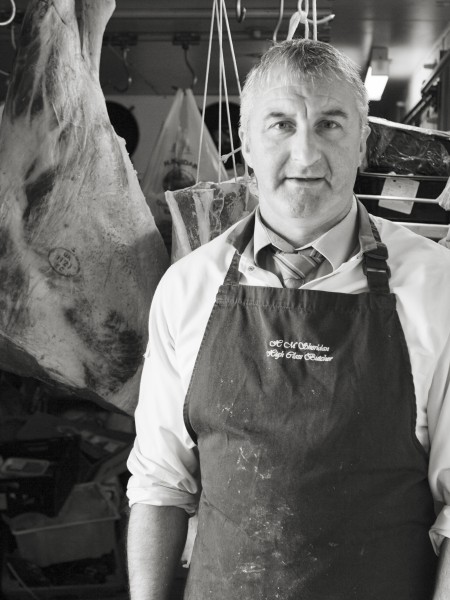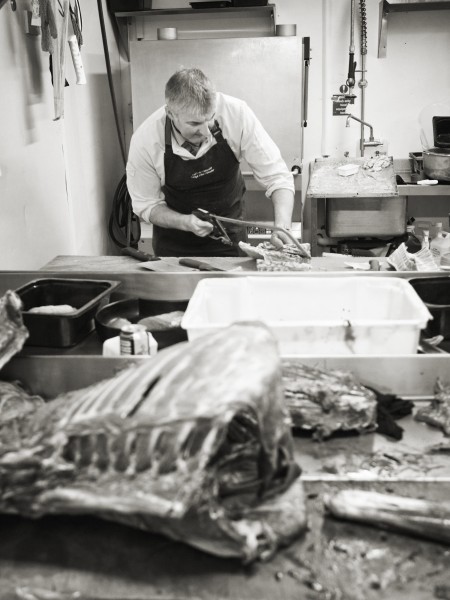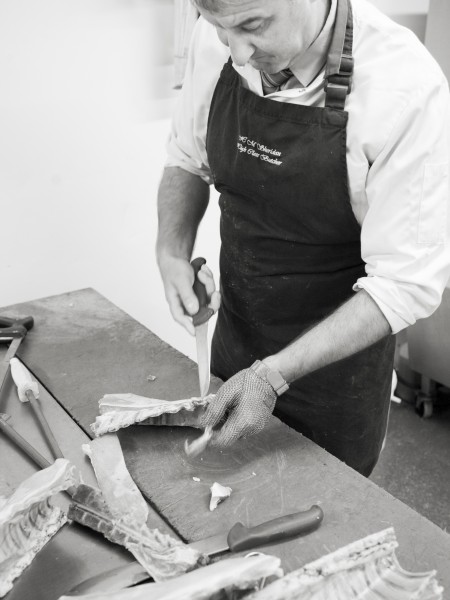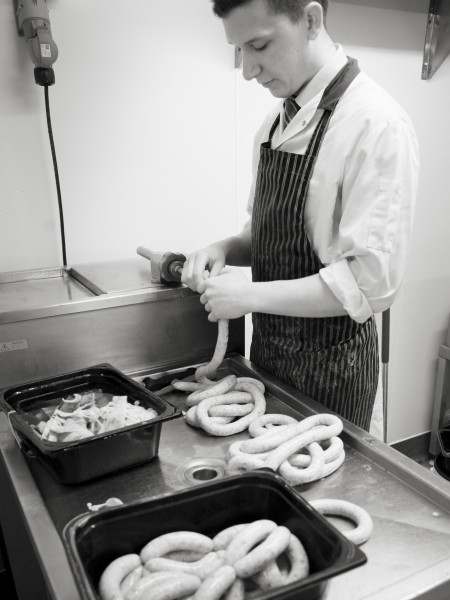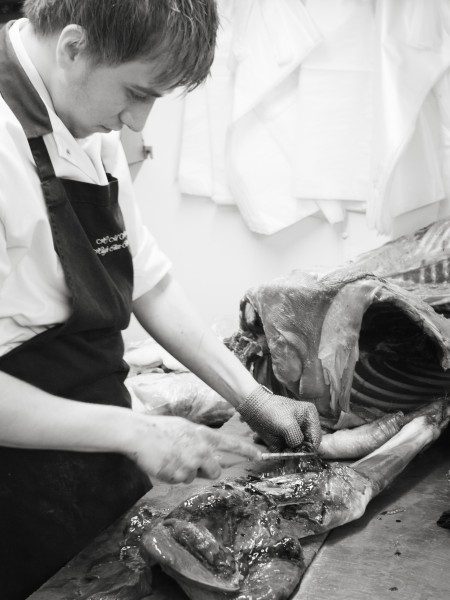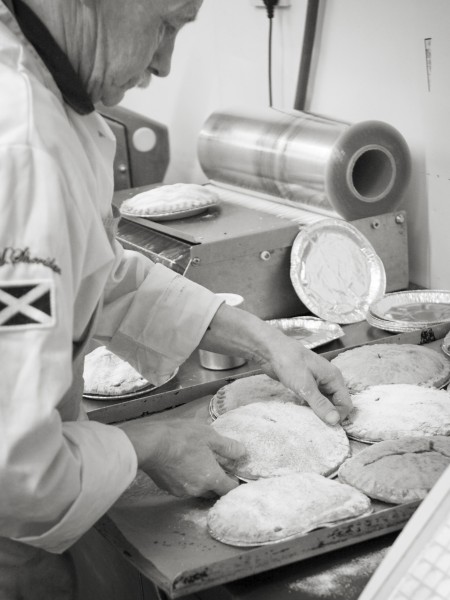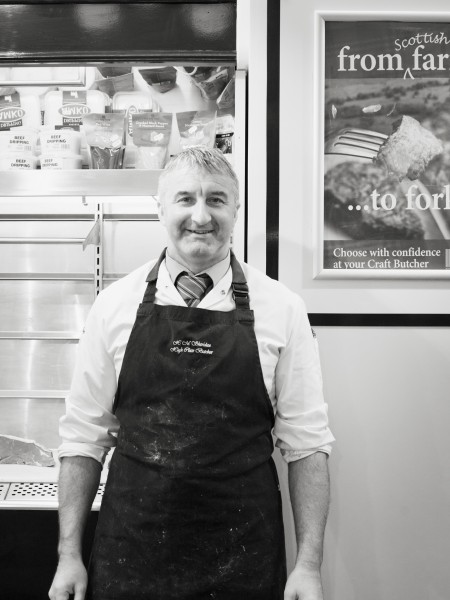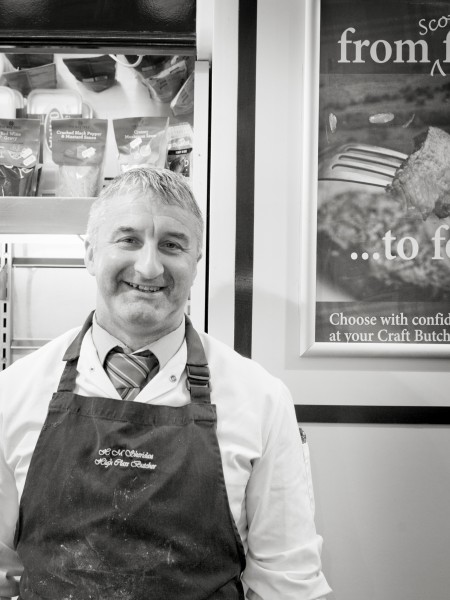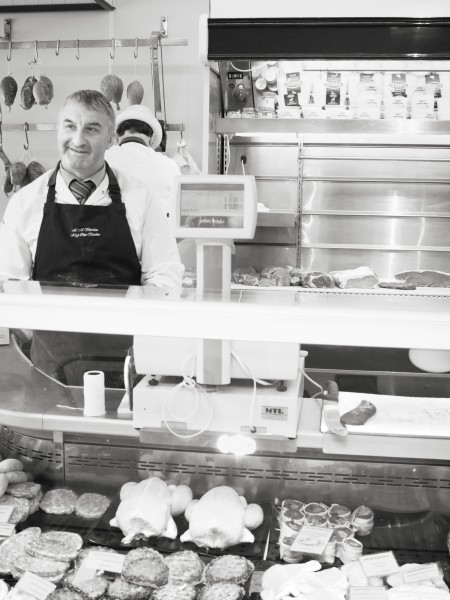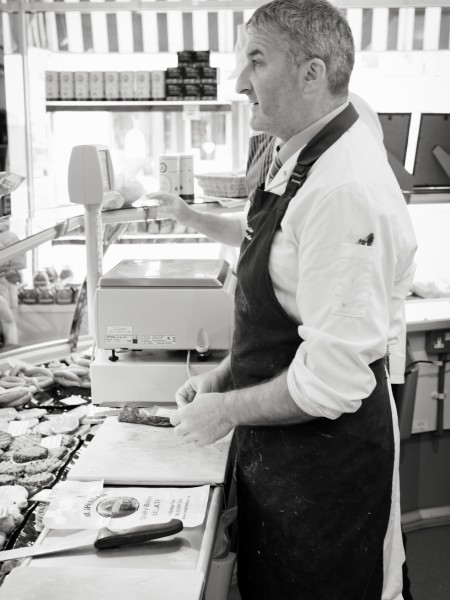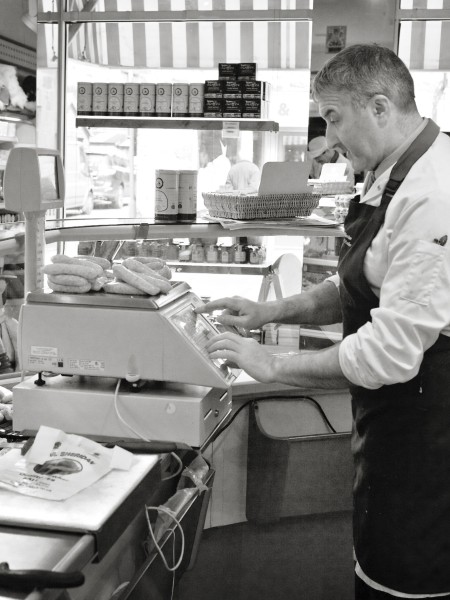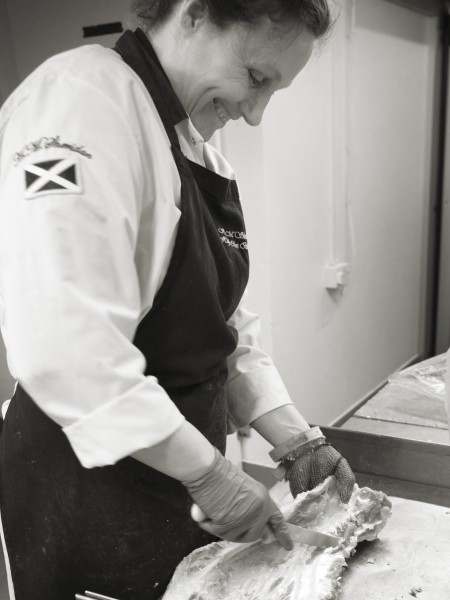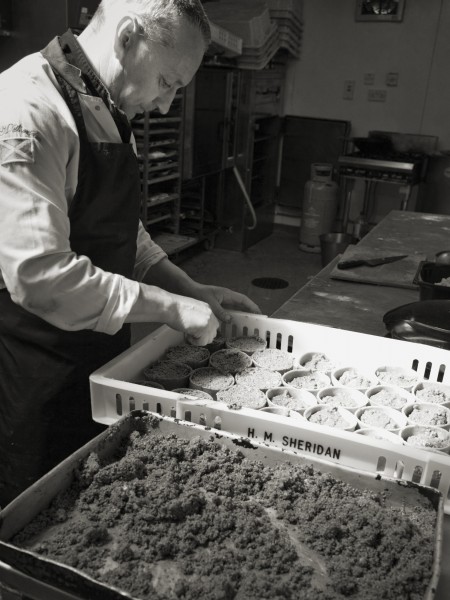Q. What would you say your principle professional skills are?
Barry: John and I are both butchers and we learnt the trade from leaving school until now.
Q. So how long is that?
Barry: Too long to count!
John: I’ve been here 30 years; he’s been here longer.
Barry: I’ve been here about 32 years
Q. And how did you learn? Was it through an apprenticeship?
Barry: Yes, we’ve both worked here since we left school. So when we started it was purely just an apprenticeship. You came and you did your five years as an apprentice and you became a fully qualified butcher.
John: There’s not a time limit on becoming a fully trained butcher now, it’s a question of working through the modules and some people do it quite quick, some people take longer, which is quite a good way of doing it; and it’s all in house and the assessor comes round and assess through questions and practical sessions and observations.
Q. So you run the training sessions here?
John: Yes.
Q. Are young people still interested in learning?
John: Yes, at the moment we have two young lads. We try and train up young lads when we need them.
Barry: It can be quite frustrating because you get school leavers and you get them through the training and they come out of the training at 20 or 21 and go into something else but that’s the nature of the beast.
The oil industry is a magnet, everybody wants to earn a few quid, we can’t compete with oil; we just don’t try.
Q. So when you are training them, do they learn to do everything across the board?
John: Yes
Barry: With the Federation there’s different levels and different qualifications. You can become a butcher – you can become a butcher’s baker, you can become a retail butcher – if you do them all; they’re all part of the modules to become a fully trained butcher.
Q. And how many people are there working here now?
Barry: Twelve
John: Twelve full time.
Q. Where do you make all the pies?
John: The pies are made in this place
Barry: We’ve got a production line.
Q. And what else has changed? Has it changed since you first started?
Barry: Massively
John: Gee wiz aye
Barry: When I started here, we hardly made anything. We made two types of sausages; we made venison sausage when someone asks us too. Now we make something like 30 different varieties of sausage. I think every thing’s taken a stage further than it used to be. You no longer sell chicken to make this… we are making chicken Kiev or making Italian style chicken ready… to put in the oven. When I started butchery the house wife came in and told us the cut of meat they wanted for a particular dish, now they come in and tell me the dish they’re making and ask me to tell them what cut they need. So I think now a butcher has to have cooking skills as well as butchery skills. They need to know what the finished product is going to be.
Q. In terms of machines and the way everything’s done, has that changed as well?
John: The basic machines are still there but they have been improved…
Barry: The machines have improved, but it hasn’t really got any more automated.
John: No.
Barry: One or two things, but on the whole it’s pretty much the same.
Q. And still using knives?
John: Oh aye, still a lot of knife skills, definitely.
Barry: you can’t get away from that. Every beast is different and needs to be cut differently. You can only tell a machine to do the same thing time and time again. Human skills are still needed to find the seams in the muscles and be able to identify if something’s not right. You can’t get a machine to do that.
Q. And where do you source all you meat?
John: We’ve got a couple of farms that breed stuff for us. We’ve got Inverurie… Elgin.
Barry: Yes, we’ve got a couple of farmers who select beasts and we get them direct from the farmer although it goes through the slaughterhouse.
Q. And the game, is that all local?
Barry: The game all comes from the local estates.
Q. What radius do you deliver to?
Banchory; daily, Deeside; daily, as far as Banchory to Aberdeen.
Q. How far north?
Barry: Well we go UK with our mail order service.
John: Online service.
Barry: Online service aye, it’s an online shop.
John: So you can actually shop online and we’ll deliver anywhere in the UK but when you use the mail order service then there is a delivery charge.
Q. Do you think it would be good if people knew a bit more about where meat comes from?
Barry: I think so, I think people are becoming more aware of where meat comes from. It’s quite funny, there was a debate on radio Scotland on Saturday morning, as I was heading to market, about educating primary school children on that their meat actually came off a farm and the chicken that you see running around is the same as the chicken that you eat. It was one of those text in things and I text in saying, ‘Yes, it is important to teach them that, but it’s important to teach them how to cook it as well,’ because that is the gap that’s missing.
Young mums and teenage girls are leaving school and setting up families and unless it comes in a packet to put in the oven with instructions on it they haven’t got clue what to do with it.
That’s the gap, how to turn something that you buy from the butchers into a meal and that’s the gap that we are trying to fill here, by educating our guys. So we’ve tried to do a bit of exchange as well with some of the hotels that we supply, they put a chef up here in the butchery.
We’ve actually talked to them about putting our apprentices in the kitchen. You can’t stand still. You’ve always got to look at changes in products, changes in the way you do things.
Q. What do you like about your job?
Barry: I don’t know anything else, it’s what I’ve done since I left school and it’s been a great progression being an apprentice to working for Mike, to managing the shop for Mike, to actually having a shop. I mean the two of us have worked together since we left school.
Q. What satisfaction do you get? What rewards?
Barry: I mean we’ve got twelve people working for us. And these guys there all making a living out of what we do here, so I mean it’s not just about making a pound for yourself, it’s local employment and I think a hell of a lot of Ballater and I’ve been brought up here and it’s keeping the place alive.
John: Definitely.
Q. And you’ve certainly got such a good reputation, that must be quite rewarding?
John: That does help. Aye, of course it does.
Barry: Yes, with the Royal connection and having the coat of arms, it’s a great privilege to have these things. I think we’re in a very special area here and I sometimes think we don’t shout loud enough about it.
